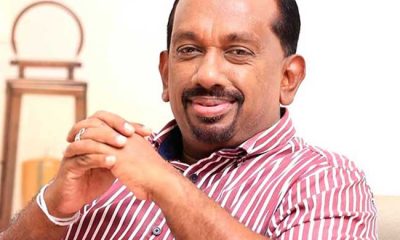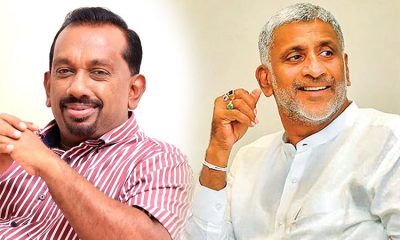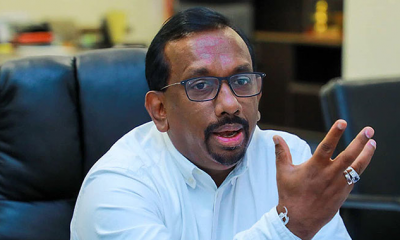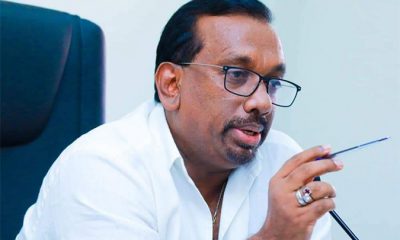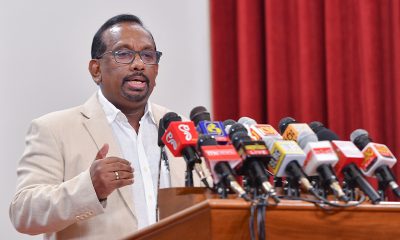News
Head of Economic Oversight Committee to move CIABOC against revenue authorities

‘Parliament amended law to favour tax defaulters, with defaulter being able to drag appealing process for 15 years’
By Shamindra Ferdinando
Chairman of Sectoral Oversight Committee on National Economic and Physical Plans Mahindananda Aluthgamage yesterday (05) said that he intended to utilise Anti-Corruption Act No 09 of 2023 against top government revenue officials who neglected their responsibilities.
The former minister said so when The Island asked him as to what specific measures were being contemplated in the New Year to compel Inland Revenue Department (IRD), Customs and Excise Department to meet the revenue targets.
Kandy District lawmaker Aluthgamage said that increased revenue last year, following repeated interventions made by Parliament, revealed that revenue collection systems/procedures had been corrupted to the core. Regardless of who wielded political power at any given time, the system favoured the tax defaulters and in turn also benefitted corrupt officials to look the other way, the SLPPer said.
The utterly flawed and corrupt system had been put in place by Parliament that, over the years, amended relevant laws at the behest of the Finance Ministry, the ex-Minister said. The bottom line is those responsible for revenue collection brazenly represented the interests of big business regardless of the consequences, MP Aluthgamage said.
The new Anti-Corruption Act came into operation on Sept 15, 2023. Lawmaker Aluthgamage said that there were specific provisions in it to deal with negligent and corrupt officials.
The enactment of the new law automatically repealed the Bribery Act (Chapter 26), the Commission to Investigate Allegations of Bribery or Corruption (CIABOC) Act No 19 of 1994 and the Declaration of Assets and Liabilities Law No 01 of 1975.
Responding to another query, MP Aluthgamage emphasized that in spite of improvement in revenue collection last year the need to establish a powerful revenue authority to monitor and regulate the three state income collecting bodies couldn’t be forgotten.
In addition, the Department of Motor Traffic, too, should be placed under close watch as it was riddled with corruption, the MP said.
The parliamentarian added that the failure on the part of successive governments to implement the Revenue Administration Management Information System (RAMIS), acquired from Singapore at a colossal cost, was yet to be fully functional. “The officialdom is bent on continuing with flawed systems for obvious reasons,” the ex-Minister said.
The vast majority of people, struggling to make ends meet, hated the new tax regime due to uncollected taxes, penalties and interests from those who could pay amounted to as much as Rs 1,000 bn by Dec 31, 2023.
MP Aluthgamage said that he strongly believed that corrupt officials should be dealt in terms of the new Anti-Corruption Act by the CIABOC.
President Ranil Wickremesinghe on Dec 21, 2023, appointed W. M. N. P. Iddawala, former Judge of the Court of Appeal and Deputy Secretary General of Parliament, as the new Chairman. Bernard Rajapakse, former Senior Deputy General Manager of the People’s Bank, and Chethiya Goonesekera, PC and Additional Solicitor General of the Attorney General’s Department, were the other members of the Commission.
The new team replaced Justice Eva Wanasundera (Chairperson), Justice Deepali Wijesundera and retired DIG Chandra Nimal Wakishta who once served as the head of State Intelligence Service (SIS). However, retired Justice W.K.D. Wijeratne remains the Director General, CIABOC.
MP Aluthgamage stressed that the recovery of unpaid taxes, penalties and fines was as important as expanding the tax base in line with the government overall strategy meant to strengthen the economy. That was one of the major IMF conditions the government had no option but to address, MP Aluthgamage said, urging political parties not to undermine government efforts.
Addressing the media at the Presidential Media Division (PMD) in late Sept 2023, MP Aluthgamage charged that incompetence and corruption at the three main revenue gathering bodies caused the government significant losses. He estimated the annual losses at approximately Rs 500 bn, with Customs being the main culprit responsible for failing to collect as much as Rs 360 bn.
The lawmaker said that those under a cloud over losses caused to the government could challenge him if they felt his assessments weren’t accurate. The one-time SLFPer said that though ill-fated political decisions caused the rapid deterioration of the economy during President Gotabaya Rajapaksa’s presidency, no one could deny the despicable role played by revenue collecting bodies.
The MP alleged that politicians and officials had colluded with the big business to amend the relevant laws to prolong the appeal process. That was the primary tool used by the interested parties, the former minister said, adding that the Parliament couldn’t absolve itself of the responsibility for this pathetic state of affairs.
Aluthgamage said that he told President Wickremesinghe that PAYE (Pay as You Earn) tax was not required at all if the government ensured proper collection of taxes.
News
34 new projects under “Clean Sri Lanka” programme this year
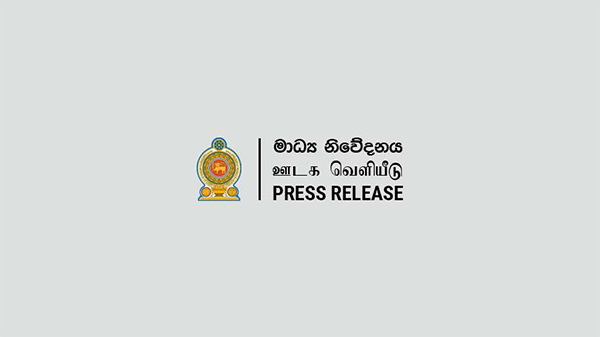
Under the guidance of President Anura Kumara Disanayake, the “Clean Sri Lanka” programme, implemented as a key government initiative is set to launch 34 new projects this year, and work on many of these projects is scheduled to commence by the end of this April.
In line with this, a one-day workshop was held on Thursday (10) at the “Clean Sri Lanka” Secretariat located in the Lotus Building at the Temple Trees, under the leadership of Secretary to the President Dr. Nandika Sanath Kumanayake. The workshop provided technical guidance on preparing project proposals in accordance with the formats required by the Department of National Planning for submission and approval.
The “Clean Sri Lanka” programme aims to foster social, environmental and ethical transformation across the country, with the active participation of all stakeholders. A sum of Rs. 5 billion has been allocated from this year’s national budget for its implementation.
Once the Department of National Planning grants approval for the proposed projects, detailed action plans will be developed in line with prescribed formats. It was agreed that projects deemed ready for implementation will commence before the end of April.
During the workshop, Secretary to the President outlined the government’s expectations and the intended outcomes of the “Clean Sri Lanka” programme.
Senior officials representing the Ministry of Public Administration, Provincial Councils and Local Government, Ministry of Foreign Affairs, Foreign Employment and Tourism, Ministry of Health and Mass Media, Ministry of Education, Higher Education and Vocational Education, Ministry of Transport, Highways, Ports and Civil Aviation, Ministry of Public Security and Parliamentary Affairs, Ministry of Agriculture, Livestock, Lands and Irrigation, Ministry of Digital Economy, Ministry of Urban Development, Construction and Housing, Ministry of Environment, Ministry of Industries and Entrepreneurship Development, Sri Lanka Police, and the Western Provincial Council were in attendance.
Also present were Engineer S.P.C. Sugeeshwara, Additional Secretary to the President (Clean Sri Lanka Programme) and G.M.R.D. Aponsu, Senior Additional Secretary to the President (Finance and Economic Affairs), along with other senior officials.
[PMD]
News
Financial assistance of USD 01 Million for the Disaster-Affected People of Myanmar
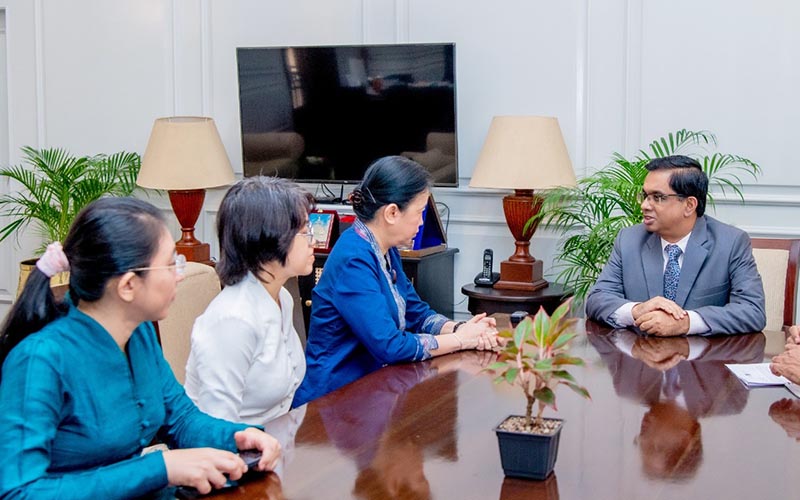
The Government of Sri Lanka has extended financial assistance amounting to USD 01 Million to provide relief to the people of Myanmar affected by the recent earthquake.
The relevant cheque was officially handed over by the Secretary to the President, Dr. Nandika Sanath Kumanayake, to the Ambassador of Myanmar to Sri Lanka, Marlar Than Htaik.on Thursday (10) at the Presidential Secretariat.
Despite the prevailing economic challenges in Sri Lanka, the Ambassador of Myanmar expressed her deep appreciation to President Anura Kumara Disanayake and the Government of Sri Lanka for this gesture of solidarity and support towards the disaster-stricken people of Myanmar.
Furthermore, the Ambassador extended her gratitude for Sri Lanka’s decision to deploy relief teams and medical personnel during this difficult time. She also noted that such acts of compassion further strengthen the longstanding religious and cultural friendship between Sri Lanka and Myanmar.
The Ambassador also briefed the Secretary to the President on the current situation in Myanmar following the earthquake.
Senior Additional Secretary to the President, Roshan Gamage, along with officials from the Embassy of Myanmar, Winh Wint Khaus Tun and Ms. Lei Yi Win, were also present at this occasion.
[PMD]
News
Indo-Lanka MoUs unlikely to be tabled in Parliament any time soon
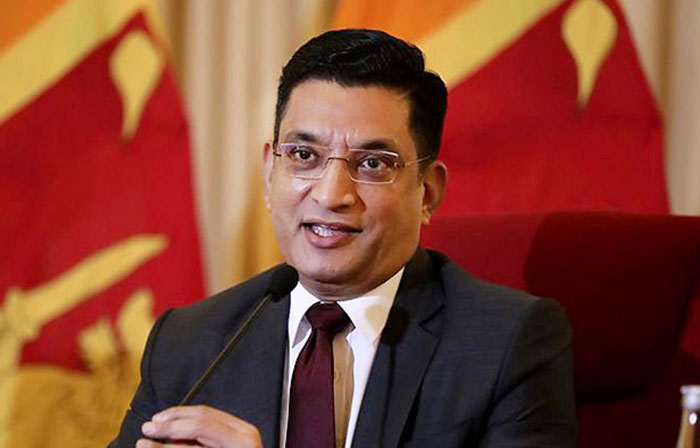
…of seven SOCs only one constituted so far
Sri Lanka’s controversial MoU on Defence Cooperation with India was unlikely to be taken up any time soon in Parliament in spite of the House Sectoral Oversight Committee (SOC) on Governance, Justice and Civil Protection that has been assigned defence, authoritative sources told The Island.
Of the seven SOCs only one was activated with the recent election of Dr. Najith Indika, MP, as the Chairman of the Sectoral Oversight Committee on Governance, Justice, and Civil Protection of the Tenth Parliament.
The inaugural meeting of the current parliament was held on 21 Nov., 2024.
Sources said that the parliament had met for the last time yesterday (10) before the Sinhala and Tamil New Year holiday. It is scheduled to meet again on May 8.
The UNDP that has financially backed the establishment of the SOC system to help strengthen the role of the parliament recently reached a consensus with the government to reduce the number of SCOCs from 17 to seven. The Island, in writing, asked for the UNDP’s reaction to the operation of SOCs but had not received a response at the time this edition went to press.
The SOCs have the power to examine any Bill, except the Bills defined in Article 152 of the Constitution, Treaty, Reports including the Annual and Performance Reports relating to the institutions coming under its purview or any other matter referred to the Committee by Parliament or any Committee or a Minister relating to the subjects and functions within their jurisdiction.
Sources said that out of the seven SOCs only one had been activated during the past five months though the government and the Opposition agreed to share the leadership of them.
Accordingly, it was agreed that the government would appoint chairpersons to four SOCs –– Economic Development and International Relations, Health, Media and Women’s Empowerment, Science, Technology and Digital Transformation and Governance, Justice and Civil Protection .
It was also agreed that the Opposition would appoint chairpersons to the SOCs on Infrastructure and Strategic Development, Education, Manpower and Human Capital, and Environment, Agriculture and Resource Sustainability to the Opposition.
India and Sri Lanka on April 5 signed six MoUs on HVDC interconnection for import/export of power, cooperation in the field of sharing successful digital solutions implemented at population scale for digital transformation, defence cooperation, multi sectoral grant assistance for Eastern province, health and medicine and pharmacopoeia cooperation. In addition to them, India, Sri Lanka and UAE signed a tripartite MoU cooperation in development of Trincomalee as an energy hub.
The Island asked Ali Sabry, PC, who served as foreign minister during Ranil Wickremesinghe’s tenure as the President (July 2022 to Sept 2024) whether the seven MoUs had been discussed during that period. We also asked him whether those MoUs should have been discussed at SOCs before finalisation.
Sabry said: “Most of the MOU to my knowledge were discussed except the one on Defence Cooperation, which I am unaware of. General procedure is the relevant line ministry prepares the initial draft and gets the input from the Foreign Ministry and goes for stakeholder consultation of all ministries and agencies involved. Then the President’s Office grants its sanction and with the approval of the AG, it goes before the cabinet of ministers. With Cabinet approval, the government could sign the MOU.”
Sabry said that he was of the opinion that once the government signed a particular MoU, it should be placed before the parliament. “MOU’s are generally not legally binding and only signify the desire to work together. If the signed MoUs were to be implemented, then they have to be followed by agreements or laws.”
He emphasised the pivotal importance of transparency in the whole process. The ex-minister said: “I think transparency is crucial in these matters. Concealment leads to speculation and assumption of the worst. The MOUs should be tabled in Parliament for public information. Discussion at the relevant SOCs would have been helpful. There are growing fears fueled by lack of information in the public domain. This is a private comment, not to be attributed to me.
Asked whether MoUs, particularly the ones on defence and energy had to be approved by the Attorney General, the former minister said that the AG has to advise the MoUs compatibility with the Constitution. “But Article 157 of the Constitution does not apply; the 2/3 majority stipulated there envisages only investment treaties.” Foreign Minister Vijitha Herath assured Parliament on April 8 that the AG had cleared all seven MoUs and none of them were inimical to the country.
By Shamindra Ferdinando
-

 Business5 days ago
Business5 days agoColombo Coffee wins coveted management awards
-

 Business7 days ago
Business7 days agoDaraz Sri Lanka ushers in the New Year with 4.4 Avurudu Wasi Pro Max – Sri Lanka’s biggest online Avurudu sale
-

 Features6 days ago
Features6 days agoStarlink in the Global South
-

 Business7 days ago
Business7 days agoNew SL Sovereign Bonds win foreign investor confidence
-

 Features3 days ago
Features3 days agoSri Lanka’s Foreign Policy amid Geopolitical Transformations: 1990-2024 – Part III
-

 Features6 days ago
Features6 days agoModi’s Sri Lanka Sojourn
-

 Midweek Review3 days ago
Midweek Review3 days agoInequality is killing the Middle Class
-

 Features5 days ago
Features5 days agoSri Lanka’s Foreign Policy amid Geopolitical Transformations: 1990-2024 – Part I


